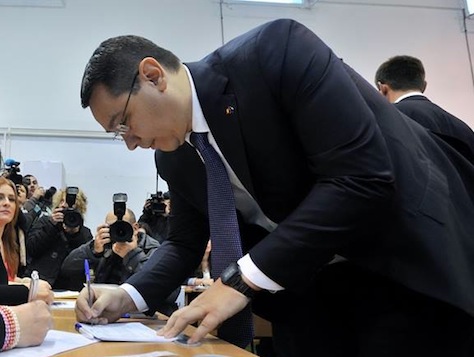It’s becoming a more German Europe in more ways that one.![]()
In a stunning upset victory, Sibiu mayor Klaus Iohannis, an ethnic German, defeated prime minister Victor Ponta, in Sunday’s Romanian presidential election, challenging confident predictions that Ponta would easily take the presidency.
Ponta’s center-left Partidul Social Democrat (PSD, Social Democratic Party), dominated both the December 2013 national parliamentary elections and the May 2014 European parliamentary elections, and Ponta entered the runoff as the prohibitive favorite after a resounding victory in the October 2 first round, when he took 40.44% of the vote to just 30.37% for Iohannis, the new leader of the center-right Partidul Național Liberal (PNL, National Liberal Party).
But Ponta’s 10-point lead disguised the fact that he fell 10% short of an absolute majority and, as voters’ minds focused on the runoff, Iohannis gained from a surge in turnout — from around 53% in the first round to over 64% in the runoff.
That’s despite the endorsement that Ponta won from third-place challenger, Călin Popescu-Tăriceanu, a former PNL leader and the country’s prime minister between 2004 and 2008, who founded the Partidul Liberal Reformator (PLR, Liberal Reformist Party) in July, helped boost Iohannis to an unexpectedly wide margin of victory — 54.50% to just 45.49% for Ponta.
Iohannis, a physics teacher by training, has served as mayor of Sibiu, a city in Transylvania, since 2000, and he led the relatively small Forumul Democrat al Germanilor din România (FDGR, Democratic Forum of Germans in Romania) from 2002 to 2013. As outgoing incumbent Traian Băsescu receded from the spotlight after a decade as president, Iohannis assumed the leadership of the PNL, the larger of Romania’s two major opposition parties, though Iohannis also had the support of Băsescu’s Partidul Democrat-Liberal (PD-L, Democratic Liberal Party).
Though the PNL joined forces with Ponta (pictured above) in 2011 to form the Social Liberal Union, it left the coalition in February 2014 to enter opposition, eyeing an alliance with the PD-L. When the PNL suffered disappointing losses in the May European elections, however, its leader Crin Antonescu stepped down, paving the way for Iohannis to reboot the party and become the joint PNL/PD-L presidential candidate.
Though ethnic Germans settled much of Transylvania, including the city of Sibiu, two waves of German exodus, first after World War II and again after the end of the Cold War and the fall of the Iron Curtain, have left few German-speaking enclaves in Romania. Today, just over 4% of Romanians are ethnically German. Continue reading Iohannis upsets Ponta in Romanian presidential election



